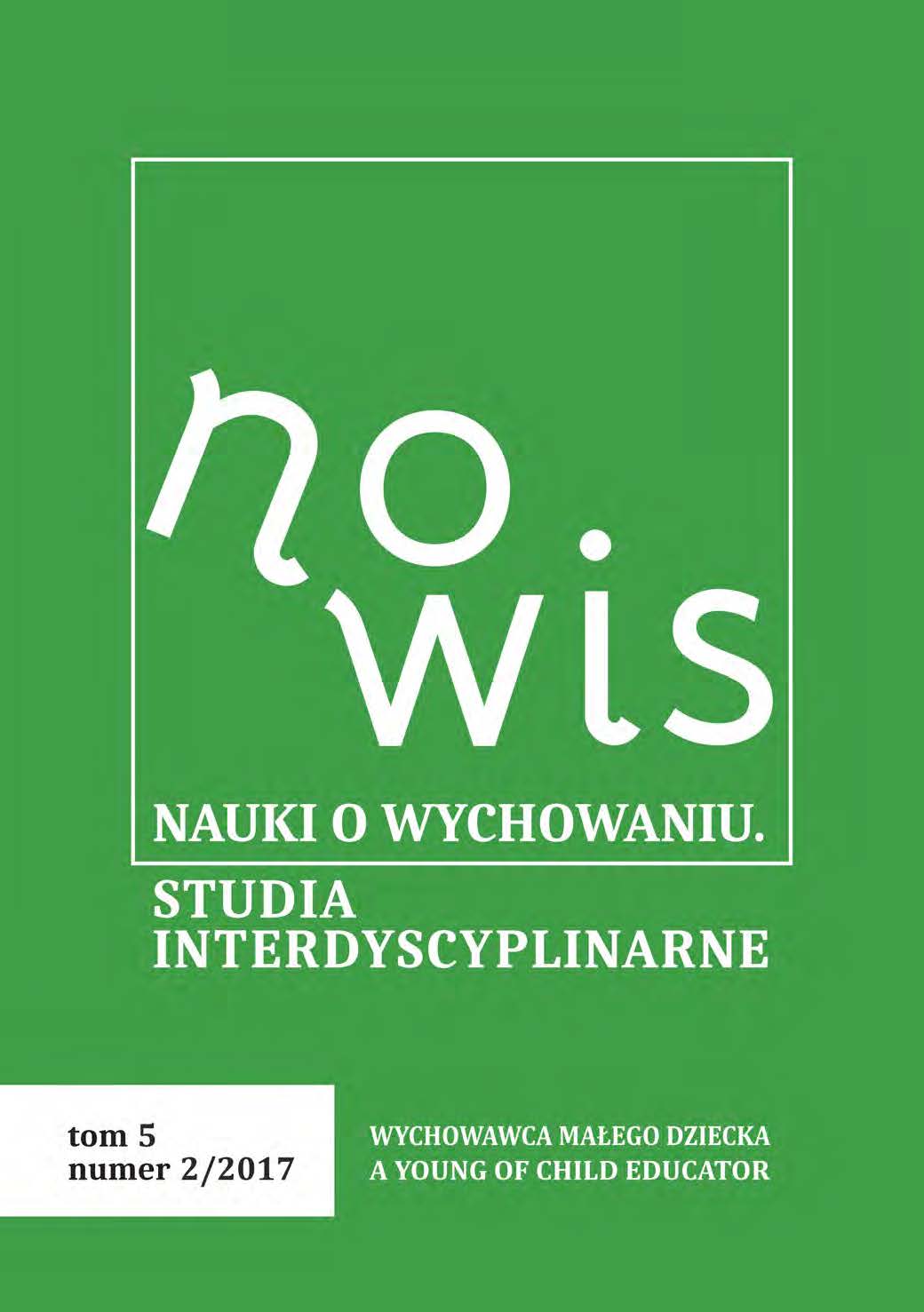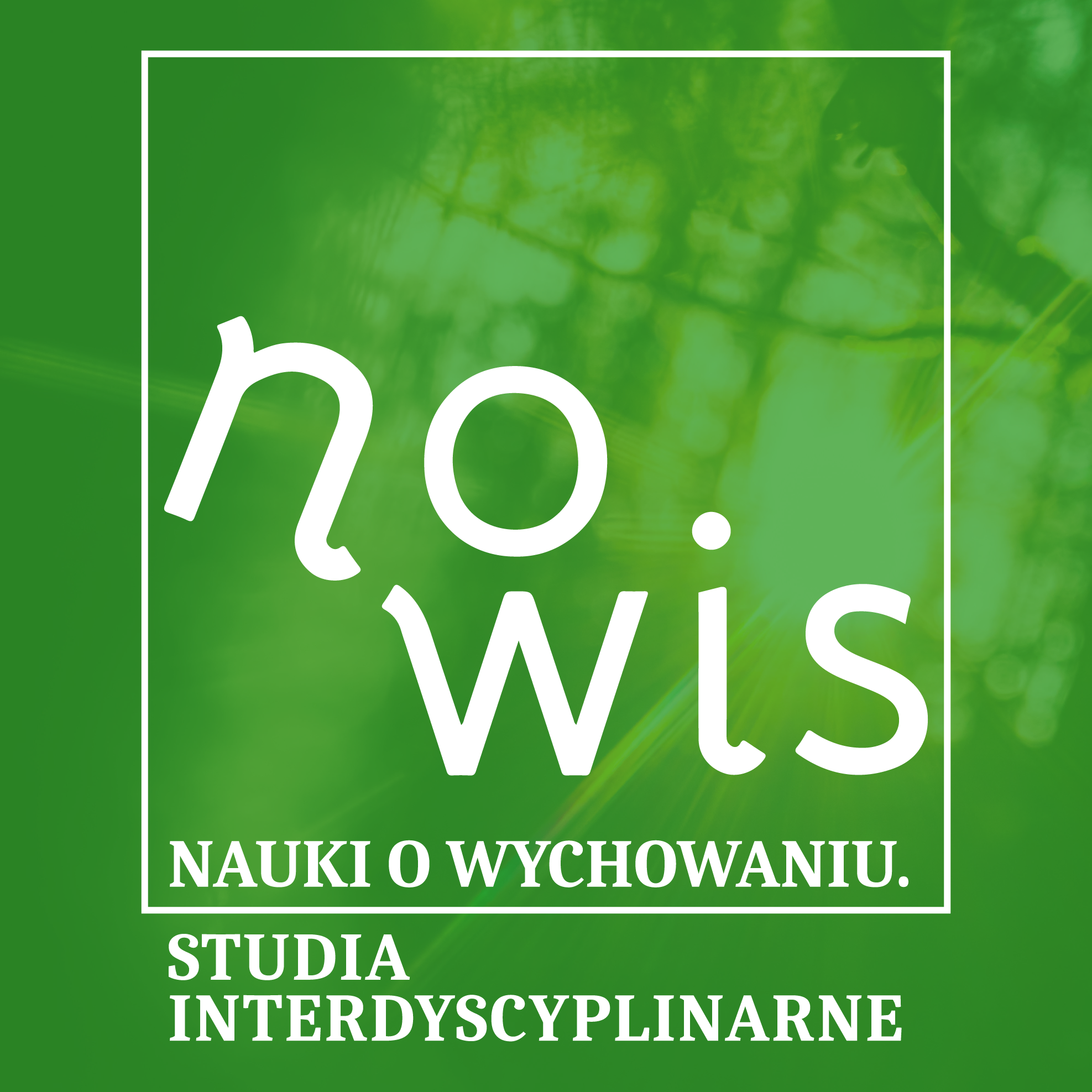Kim są dzieci, jak się uczą? – jakościowa analiza wywiadu z wychowawcami w żłobku
DOI :
https://doi.org/10.18778/2450-4491.05.05Mots-clés :
wychowawcy, żłobek, teorie osobiste, teoria ugruntowana, ko-konstrukcja znaczeń i sensów pracy z najmłodszymi dziećmiRésumé
W artykule przedstawiono rezultaty wywiadu grupowego z wychowawcami w żłobku, podczas którego wypowiadali się oni na temat różnych istotnych dla nich kwestii, dotyczących relacji z dziećmi, starali się odkryć swoje osobiste na ten temat „teorie” (implicit theories). W analizie danych inspirowano się założeniami teorii ugruntowanej. Wypowiedzi wychowawców wpisują się w dużym stopniu w globalnie akceptowane tezy na temat wysokiej jakości oddziaływania instytucjonalnego, sprzyjającego rozwojowi dziecka.
Références
Adair J., Pastori G. (2011) Developing Qualitative Coding Frameworks for Educational Research: Immigration, Education and the Children Crossing Borders project, „International Journal of Research and Method in Education”, 34 (1), s. 31–47.
View in Google Scholar
Alasuutari P. (1996) Theorizing in qualitative research; A cultural studies perspective, „Qualitative Inquiry”, 2, s. 371–384.
View in Google Scholar
Alexander R. (2008) Culture, dialogue and learning: Notes on an emerging pedagogy w: Exploring talk in school, N. Mercer, S. Hodgkinson (red.), London, Sage, s. 91–114.
View in Google Scholar
Alexander R. (2005) CULTURE, DIALOGUE AND LEARNING: NOTES ON AN EMERGING PEDAGOGY. Education, Culture and Cognition: intervening for growth, International Association for Cognitive Education and Psychology (IACEP) 10th International Conference, University of Durham, UK, 10–14 July 2005, Keynote: 12 July 2005.
View in Google Scholar
Bredekamp S., Copple C. (red.) (1997) Developmentally appropriate practice in early childhood programs serving children from birth through age 8, Revised Edition, Washington, DC, National Association for the Education of Young Children.
View in Google Scholar
Charmaz K. (2009) Teoria ugruntowana. Praktyczny przewodnik po analizie jakościowej, tłum. B. Komorowska, Warszawa, Wydawnictwo Naukowe PWN.
View in Google Scholar
Dahlberg G., Moss P., Pence A. (2000) Beyond the Quality of Early Childhood Education. Postmodern Perspectives, London, Routledge Falmer.
View in Google Scholar
Dahlberg G., Moss P., Pence A. (2013) Poza dyskursem jakości w instytucjach wczesnej edukacji i opieki. Języki oceny, tłum. K. Gawlicz, DSW, Wrocław.
View in Google Scholar
Glaser B. (1978) Theoretical sensitivity, Mill Valley, CA, The Sociology Press.
View in Google Scholar
Harkness B., Super C. M. (2004) Themes and Variations: Parental Ethnotheories in Western Cultures w: Parental Beliefs, Parenting, and Child Development in Cross-Cultural Perspective, K. Rubin (red.), New York, Psychology Press.
View in Google Scholar
Harkness B. i in. (2010) Parental Ethnotheories Of Children’s Learning w: The Anthropology Of Learning In Childhood, D. G. Lanch, F. Gaskins (red.), Lanham, MD, Alta-Mira Press, s. 65–81.
View in Google Scholar
Harms T., Clifford R. M., Cryer D. (1997) Early Childhood Environment Rating Scale, Revised Edition, New York, London, Teacher College Press, Columbia University.
View in Google Scholar
Ishimine K., Tayler C. (2014) Assessing Quality in Early Childhood Education and Care, „European Journal of Education”, 49 (2), s. 272–290.
View in Google Scholar
Justice L. M., Mashburn A., Hamre B., Pianta R. (2008) Quality of Language and Literacy Instruction in Preschool Classrooms Serving At-Risk Pupils, Early Child Res Q.Mar, 23 (1), s. 51–68.
View in Google Scholar
Katz L. (2004) Wielorakie spojrzenie na jakość nauczania początkowego w: Nigdy nie jest za wcześnie – rozwój i edukacja małych dzieci, T. Ogrodzińska (red.), Warszawa, Fundacja Rozwoju Dzieci im. Jana Amosa Komeńskiego.
View in Google Scholar
Klus-Stańska D. (2010) Dydaktyka wobec chaosu pojęć i zdarzeń, Warszawa, Wydawnictwo Akademickie „Żak”.
View in Google Scholar
Konecki K. (2000) Studia z metodologii badań jakościowych. Teoria ugruntowana, Warszawa, Wydawnictwo Naukowe PWN.
View in Google Scholar
La Paro K., Hamre B., Pianta R. (2012) The Classroom Assessment Scoring System (CLASS), Manual, Toddlers, Baltimore, Brookes.
View in Google Scholar
Mashburn A. J., Hamre B. K., Downer J. T., Pianta R. C. (2006) Teacher and classroom characteristics associated with teachers’ ratings of prekindergartners’ relationships and behaviors, „Journal of Psychoeducational Assessement”, 4 (24), s. 367–380.
View in Google Scholar
Montie J., Xiang Z., Schweinhart L. J. (2007) The role of preschool experience in chil-dren’s development, High Scope Press, Press.
View in Google Scholar
Moran M. J., Bové C., Brookshire R., Braga P., Mantovani S. (April 2017) Learning from each other: The design and implementation of a cross-cultural research and professional development model in Italian and US toddler classrooms, „Teacher and Teacher Education”, 63, s. 1–11.
View in Google Scholar
Moran M., Mantovani S., Braga P., Bove C., Brookshire R. (w druku) Learning from Each Other: Cross-cultural Research on Italian and U.S., Early Childhood Professional Development and Toddler Teacher Practice.
View in Google Scholar
Nowicka M. (2016) Wartości w świecie dziecka w przekonaniach dorosłych – przyszłych nauczycieli, „Problemy Wczesnej Edukacji”, 2 (33), s. 152–165.
View in Google Scholar
Pastori G., Mantovani S., Braga P., Pagani V. (2015) Manual case study, qualitative and cultural study and analysis (mps.).
View in Google Scholar
Pianta R. C., La Paro K. M., Hamre B. K. (2008) The Classroom Assessment Scoring System (CLASS), Manual, Pre-K, Baltimore, Brookes.
View in Google Scholar
Rapley T. (2010) Analiza konwersacji, dyskursu i dokumentów, tłum. A. Gasior-Niemiec, Warszawa, Wydawnictwo Naukowe PWN.
View in Google Scholar
Rogoff B. (2008) Observing sociocultural activity on three planes: Participatory appropriation, guided participation and apprenticeship w: Pedagogy and practice: Culture and identities, P. Murphy, K. Hall, J. Soler (red.), Los Angeles, Sage, s. 58–74.
View in Google Scholar
Spodek B. (1987) Thought processes underlying preschool teachers’ classroom decisions, „Early Child Development and Care”, 29 (2), s. 197–208.
View in Google Scholar
Stipek D., Byler P. (1997) Early childhood education teachers: Do they practice what they preach?, „Early Childhood Research Quarterly”, 12 (3), s. 305–325.
View in Google Scholar
Telka L. (2007) Przekształcanie przestrzeni społecznej placówki. Studium społeczno-pedagogiczne na przykładzie żłobków, Łódź, Wydawnictwo Uniwersytetu Łódzkiego.
View in Google Scholar
Telka L. (2012) Wspieranie autonomii małego dziecka w placówce – wychowanek i wychowawca, „Problemy Współczesnej Edukacji”, nr 4 (19), s. 6–20.
View in Google Scholar
Tobin J. J., Arzubiaga A., Adair J. (2014) Children crossing borders. Immigrant parents and teachers perspectives on preschool, Los Angeles, Sage.
View in Google Scholar
Tobin J. J., Hsueh Y., Karasawa M. (2009) Preschool in Three Cultures. Revisited, Chicago, University of Chicago Press.
View in Google Scholar
Tobin J. J., Mantovani S., Bové C. (2010) Methodological Issues in Video Based Research on Immigrant Children and Parents in Early Childhood Settings, Phenomenology and Human Research Today, Zeta Books, s. 204–225.
View in Google Scholar
Tobin J. J., Wu D., Davidson D. (1989) Preschool in Three Cultures: Japan, China, and the United States, New Haeven, C.T., Yale University Press.
View in Google Scholar
Woodhead M. (1998) Dążenie ku tęczy. Poszukiwanie standardów jakości edukacji, Warszawa, tłum. M. Rączkowska, red. nauk. M. Karkowska-Struczyk, Wydawnictwo Akademickie „Żak”.
View in Google Scholar
Yin R. (2015) Studium przypadku w badaniach naukowych, tłum. J. Gilewicz, Wydawnictwo Uniwersytetu Jagiellońskiego, Kraków.
View in Google Scholar
Téléchargements
Publiée
Comment citer
Numéro
Rubrique
Licence

Ce travail est disponible sous licence Creative Commons Attribution - Pas d'Utilisation Commerciale - Pas de Modification 4.0 International.





 Le site web de la revue, hébergé par l'équipe éditoriale de NOWIS se trouve sur la plate-forme Index Copernicus:
Le site web de la revue, hébergé par l'équipe éditoriale de NOWIS se trouve sur la plate-forme Index Copernicus: 





